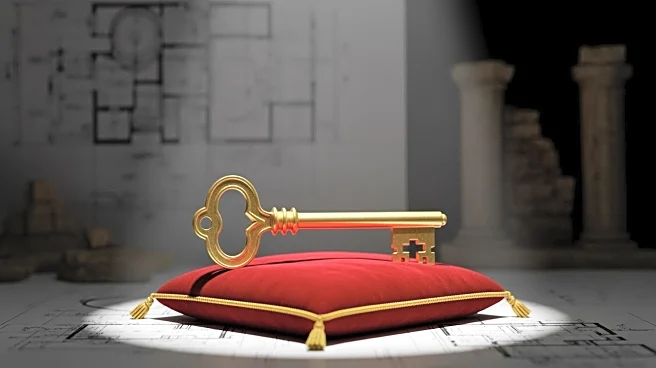What's Happening?
During a recent discussion about the new White House ballroom, Mishpacha's Jake Turx posed a question to Press Secretary Karoline Leavitt regarding President Trump's potential plans to rebuild the Holy
Temple in Jerusalem. This inquiry was raised amidst broader conversations about the administration's activities and future projects. The question highlights ongoing interest and speculation about President Trump's involvement in significant religious and cultural projects, particularly those related to Jerusalem, a city of profound historical and spiritual significance.
Why It's Important?
The question about President Trump's plans for the Third Temple in Jerusalem touches on sensitive religious and geopolitical issues. Jerusalem holds deep religious significance for multiple faiths, and any plans to rebuild the Temple could have far-reaching implications for international relations and religious communities. Such a project could influence U.S. foreign policy, particularly in the Middle East, and affect diplomatic relations with Israel and other nations. It also raises questions about the intersection of politics and religion in U.S. governance, potentially impacting public opinion and voter sentiment.
What's Next?
If President Trump were to pursue plans for the Third Temple, it would likely prompt reactions from various stakeholders, including religious leaders, international diplomats, and political figures. The project could lead to discussions about funding, construction logistics, and the political ramifications of such an endeavor. Additionally, it may spark debates within the U.S. about the role of government in religious matters and the implications for U.S.-Israel relations. Observers will be watching for any official statements or policy announcements from the White House regarding this topic.
Beyond the Headlines
The inquiry into President Trump's plans for the Third Temple also highlights broader cultural and ethical considerations. The rebuilding of the Temple is a topic of significant religious prophecy and expectation, which could influence cultural narratives and religious discourse. It may also raise ethical questions about the preservation of historical sites and the impact on local communities in Jerusalem. The potential project could serve as a catalyst for discussions about religious freedom, cultural heritage, and the responsibilities of political leaders in addressing such complex issues.









